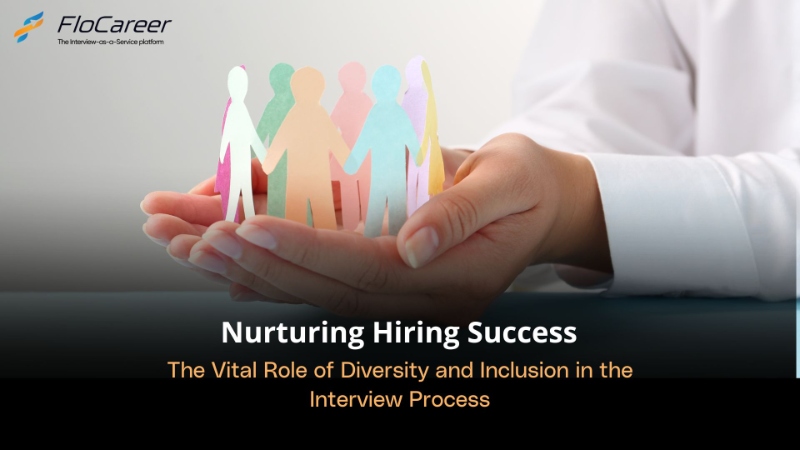Nurturing Hiring Success: The Vital Role of Diversity and Inclusion in the Interview Process
In the dynamic landscape of modern business, the significance of diversity and inclusion extends beyond mere rhetoric, emerging as a linchpin in successful corporate strategies. A workplace culture characterized by diversity and inclusion not only enhances customer understanding and fosters innovation but also significantly impacts financial performance. This transformative journey begins with the recruitment and interview process—a continuous commitment rather than a one-time effort. This article delves into the imperative of diversity and inclusion in the interview process, unraveling its profound benefits for companies.

Why Diversity and Inclusion in Hiring Matters
The Business Case for Diversity Hiring
Diversity in the workforce is not just a moral imperative; it is a strategic advantage. Research consistently demonstrates that companies with diverse teams exhibit higher levels of innovation, superior problem-solving skills, and greater adaptability to change. Financial performance, employee engagement, and retention rates also soar in diverse workplaces. Moreover, the ability to understand and cater to the needs of a diverse customer base enhances customer satisfaction and loyalty, positioning diversity as a driving force behind holistic business success.
The Importance of Inclusive Interviewing
Crafting an Inclusive Job Description
The inception of an inclusive workplace begins with the crafting of an inclusive job description. Utilizing language that is neutral and welcoming, devoid of biases based on race, gender, or other characteristics, ensures a broader appeal. Emphasizing skills and qualifications over traditional credentials creates an environment where candidates from diverse backgrounds feel equally valued.
Diversity Recruitment Best Practices
Diverse Sourcing Methods:
Leverage a variety of sourcing methods, including job postings on diverse job boards, outreach to diverse professional organizations, and employee referrals from a diverse workforce.
Review and Revise Job Descriptions:
Regularly review job descriptions to eliminate biased language or requirements that may disproportionately exclude diverse candidates.
Analyze the Interviewing Process:
Scrutinize the hiring process to identify and eliminate areas of bias. Implement structured interviews and leverage tools to measure and mitigate interviewer bias.
Establish Diversity Goals:
Set specific goals for increasing diversity within the organization and consistently measure progress towards those goals.
Foster an Inclusive Culture:
Cultivate a workplace culture that champions diversity and inclusion through employee resource groups, diversity training programs, and mentorship opportunities for underrepresented groups.
Overcoming the Challenges of Diversity Hiring
Despite the myriad benefits, companies often face challenges in realizing diversity hiring goals. One significant obstacle is the lack of diversity in the candidate pool. Proactive recruitment strategies, including partnerships with diverse organizations and professional associations, can address this challenge. Another hurdle is ensuring fair evaluation of diverse candidates in the interview process. This necessitates comprehensive training for interviewers, focusing on the recognition and elimination of unconscious biases.
Importance of Inclusive Interview Process
The creation of an inclusive interview process is paramount. Ensuring equal opportunities for all candidates, regardless of their background or identity, demands specific measures:
Use Structured Interviews:
Implement structured interviews with standardized questions to eliminate bias, ensuring every candidate is evaluated based on the same criteria.
Focus on Job-Related Criteria:
Orient interview questions towards job-related criteria, emphasizing skills and experience rather than personal characteristics.
Provide Accommodations:
Offer accommodations for candidates who may require them, such as accessible interview locations or extra time for candidates with disabilities.
Train Interviewers:
Provide training to interviewers on recognizing and eliminating bias in the interview process.
Diversify the Interview Panel:
Assemble a diverse interview panel to minimize individual biases and ensure a fair and equitable evaluation of all candidates.
Why Diversity Hiring is Important
Beyond moral obligations, diversity hiring is pivotal for several reasons. Diverse teams are proven to be more innovative, creative, and adept at solving complex problems. A diverse workplace enhances customer service by fostering understanding and connection with a broad customer base. From a business standpoint, diverse companies consistently outperform their less diverse counterparts, boasting higher revenue, better innovation, and improved employee retention.
Best Practices for Diversity Hiring
The pursuit of diversity in hiring demands a strategic and deliberate approach. Best practices include:
Use Diverse Sourcing Methods:
Employ various sourcing methods, including job postings on diverse job boards and outreach to diverse professional organizations.
Review and Revise Job Descriptions:
Regularly review job descriptions to eliminate biased language and ensure inclusivity.
Analyze the Interviewing Process:
Scrutinize the hiring process to identify and eliminate areas of bias. Implement structured interviews and tools to measure and mitigate interviewer bias.
Establish Diversity Goals:
Set specific goals for increasing diversity within the organization and measure progress consistently.
Foster an Inclusive Culture:
Cultivate a culture that values and supports diversity and inclusion through various initiatives.
In conclusion, fostering a diverse and inclusive workplace is not just a moral obligation—it's a business imperative. The interview process serves as a pivotal juncture in promoting diversity and inclusion in hiring. By embracing inclusive interviewing techniques and diversity hiring practices, companies can attract a more diverse pool of candidates. This ensures the selection of the best candidates based on their skills and qualifications, rather than factors such as race or gender.
Companies striving for an inclusive workplace must continually evaluate and improve their hiring processes. This not only makes employees feel valued, respected, and empowered but also contributes to a collaborative environment where diverse experiences and perspectives are celebrated. In the pursuit of excellence, organizations must recognize that diversity and inclusion are not merely checkboxes but integral components that drive innovation, creativity, and sustained success. The interview process, with its power to shape the workforce, becomes a canvas where the strokes of diversity and inclusion paint a masterpiece of organizational brilliance. Embrace this journey, not just as an obligation, but as a commitment to a future where every candidate is given an equal opportunity to shine, and every workplace thrives on the richness of its diversity.
Master the art of interviewing by implementing Interview Intelligence. Check out our latest blog


